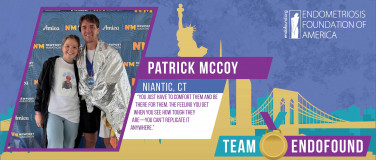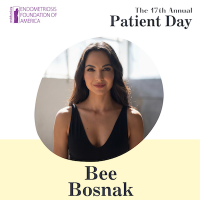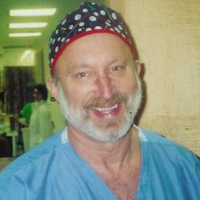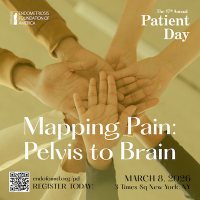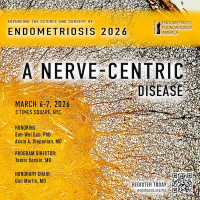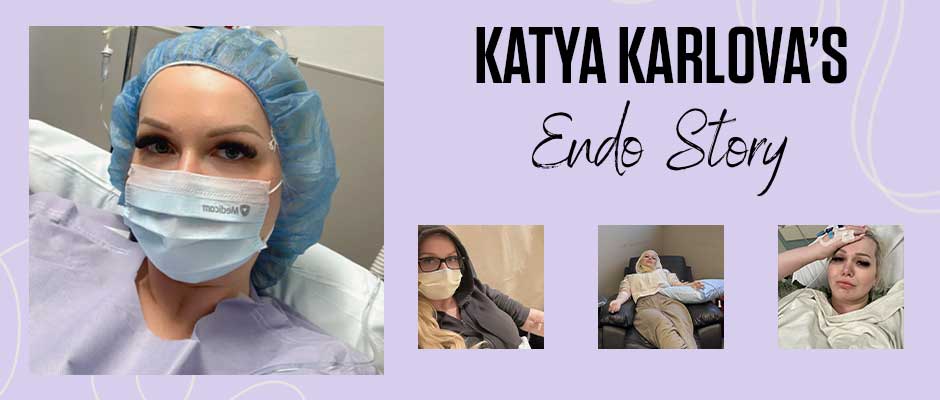
Nearly all stories from endometriosis patients about their journeys with the disease have a level of incredulity. It could be the time it took for them to get diagnosed, the imprudent comments made by their healthcare providers, or the ineffective treatments their doctors offered.
And then there’s Katya Karlova’s story, which may be in a class of its own.
“I use three words to describe what my doctor did to me: ignorance, negligence, and arrogance,” Karlova said. “I’ve heard so many terrible endometriosis stories, and I know mine is up there with the really bad ones because of how much I’ve lost and the way I lost it. I’m sharing it because I don’t want anyone to ever go through what I’ve been through.”
The 38-year-old native of the Republic of Moldova is a Los Angeles-based model, public speaker, and endometriosis advocate. It took 22 years after her symptoms began for her to be diagnosed with the disease.
“My periods started when I was 13. They were excruciating, and sometimes I’d miss school because of them,” Karlova said. “My mom didn’t know what to do, so she’d give me a Vicodin and let me rest. Doctors always just dismissed it by saying it was normal, I had a low pain tolerance, or I was being dramatic.”
After graduating from UCLA in three years, Karlova worked in the corporate world as the head of talent in various industries, including healthcare and oil. Throughout her twenties, she had to balance work with navigating harsh period pain that lasted for a week each month.
“I’d explain to my gynecologist that I was having these symptoms every month—a sharp, stabbing pain that felt like barbed wire around my stomach,” Karlova said. “All he’d say is, ‘It sounds like PMDD [Premenstrual Dysphoric Disorder]. You just have severe periods.’ He pushed me to go on birth control, but my body wouldn’t tolerate it. So he’d write me a prescription for what was essentially Aleve, which did nothing.”
Karlova found herself in the ER with a ruptured cyst when she was 27, but the staff didn’t run any tests to try to determine the cause, nor did they suggest she might have endometriosis. By her early thirties, Karlova’s week-long period pain each month extended to two weeks.
“I had to plan my life around tracking my period because I knew I’d be out of commission for half the month. It affected my intimacy with my husband, my ability to exercise, my career, everything,” she said. “And you don’t even have an answer for it. All you can say is that you’re in pain.”
In 2022, following years of failed visits to several doctors and more than 30 futile trips to the ER, Karlova’s husband stepped in and demanded answers.
“That’s what it took for a doctor to finally listen—my husband coming to an appointment with me because they’d believe him and not me,” Karlova said. “He told them that I couldn’t keep living in this uncertain hell. That’s when they finally said, ‘Well, it could be endometriosis. I guess we’ll do an exploratory surgery.’ That was the first time I’d ever heard of endometriosis.”
The surgery was in August of that year. However, the doctor avoided the endometriosis completely, adding another layer to Karlova’s 22 years of suffering.
“My doctor said, ‘I’m going to do an ablation in your uterus so that you don’t have any more periods. That’s how we treat this,’” Karlova said. “And I, being naïve and not knowing anything about endometriosis to know the correct surgery I should be having, went along with it. So she did the ablation in my uterus and didn’t actually remove any of the endo.”
Karlova said her periods stopped, and she initially felt some relief, but the pain roared back after just a few months. She returned to the same doctor, who found a cyst on one of her ovaries. Karlova had a second surgery in December.
“She didn’t have the skill level to remove the cyst and leave the ovary, so she said, ‘Let’s just take the ovary. The other ovary will kick in and you’ll be fine.’”
Karlova wasn’t fine. Not only did the pain continue, but a blood clot developed under the scar tissue in her uterus from the first surgery. That led to a third surgery in early April 2023.
“She did another ablation in my uterus, and a week later, I was in the worst pain of my life,” Karlova said. “I went back to her, and she said, ‘It’s all in your head. It’s just rebound pain.’ I went to the emergency room, where they ran tests and said the blood clot was still there. They said I needed to find a new surgeon ASAP.”
Karlova found an endometriosis specialist immediately, who performed excision surgery just weeks later. Karlova had stage III endometriosis throughout her pelvic region, bowels, and lower back. She also had adenomyosis.
“I paid the previous doctor $75,000 for three endometriosis surgeries [the doctor was out-of-network], in which she didn’t remove a single endometriosis lesion and made me worse. I felt like I paid her for abuse,” Karlova said. “She also scarred my uterus so badly that the new surgeon had to remove it because the blood clots would have continued to develop and the pain would have persisted.”
Karlova fought back tears as she reflected upon losing her uterus.
“It forever scarred me and changed my life,” she said. “My husband and I don’t have children. We weren’t sure when we would try, but we certainly wanted that option. Now, it’s just gone. When I see other women get pregnant, I know that will never be me because of someone who was so arrogant.”
Physically, Karlova is still recovering more than two years later, but she is gradually improving.
“I’m a lot better and a lot healthier,” she said. “I also have an interventional pain doctor who does Botox pain injections to my pelvic floor, which keeps the pain at bay for the most part.”
Around the time of her surgeries, Karlova left Corporate America to pursue a career as a model and write her memoir, which she is currently working on. She has amassed more than half a million followers on social media and has been featured in numerous publications, including Forbes, Cosmopolitan UAE, and Grazia. She now uses her platform to share her endometriosis story.
“I want others with endometriosis to learn from my mistakes,” Karlova said. “The doctor who did the first three surgeries painted herself as an expert who knew what was best for me, but I didn’t do enough research or advocate enough for myself. Forget the dynamic we’re taught that the physician is on a pedestal and in a position of power. Flip it around! You hold the power. Demand answers. Don’t let them dismiss you. Ask them the tough questions. You’re putting your life in the hands of someone who may or may not know what they’re doing.”
Karlova also wants to help those with endometriosis avoid the mind games that the disease inflicted upon her.
“I felt for so long that I was a burden on others. My family was always worried about me, and my friendships suffered. I couldn’t be there for them when they needed me. I missed events that I was invited to. I felt like I was constantly letting everybody down, and I couldn’t explain it. The guilt and shame were not mine to carry, but I still did,” she said.
“I want to teach women about courage, resilience, and how to get through and grow from the difficult times in their lives,” she continued. “My goal, no matter what someone’s circumstances may be, is to show them how they can go from being a victim to taking control of their life. When the world is against you, use that trauma to make yourself stronger.”



